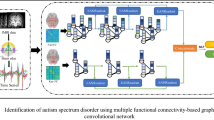Abstract
Nowadays, Autism spectrum disorder (ASD) is a neurodevelopmental disorder that severely affects social communication. The diagnostic criteria depend on clinicians’ subjective judgment of the patient’s behavioral criteria. Obviously, it is an urgent problem to establish an objective diagnosis method for patients with ASD. To address this problem, we propose a novel graph convolutional network(GCN) method based on relational attention mechanism. Firstly, we extract functional connectivity (FC) between brain regions from functional magnetic resonance (fMRI) effects that respond to blood oxygenation signals in the brain. Considering the different relationships between subjects, population relations are then modeled by graph structural models as a way to jointly learn population information. Finally, for individual-specific information, a relational attention mechanism is used to generate relationships between subjects and GCN is utilized to learn their unique representational information. Our proposed method is evaluated 871 subjects (including 403 ASD subjects and 468 typical control (TC) subjects) from the Autism Brain Imaging Data Exchange (ABIDE). The experimental results show that the mean accuracy and AUC values of our proposed method can obtained 90.57% and 90.51%, respectively. Our proposed method has achieved state-of-the-art performance in the diagnosis of ASD compared to some methods published in recent years. Overall, our method is effective and informative in guiding clinical practices.
Access this chapter
Tax calculation will be finalised at checkout
Purchases are for personal use only
Similar content being viewed by others
References
Abraham, A., et al.: Deriving reproducible biomarkers from multi-site resting-state data: an autism-based example. Neuroimage 147, 736–745 (2017)
Amendah, D., Grosse, S.D., Peacock, G., Mandell, D.S.: The economic costs of autism: a review. Autism Spectrum Disorders 1347–1360 (2011)
Brahim, A., Farrugia, N.: Graph fourier transform of fMRI temporal signals based on an averaged structural connectome for the classification of neuroimaging. Artif. Intell. Med. 106, 101870 (2020)
Huang, Y., Chung, A.C.S.: Edge-variational graph convolutional networks for uncertainty-aware disease prediction. In: Martel, A.L., et al. (eds.) MICCAI 2020. LNCS, vol. 12267, pp. 562–572. Springer, Cham (2020). https://doi.org/10.1007/978-3-030-59728-3_55
Kazi, A., et al.: InceptionGCN: receptive field aware graph convolutional network for disease prediction. In: Chung, A.C.S., Gee, J.C., Yushkevich, P.A., Bao, S. (eds.) IPMI 2019. LNCS, vol. 11492, pp. 73–85. Springer, Cham (2019). https://doi.org/10.1007/978-3-030-20351-1_6
Kazi, A., et al.: Graph convolution based attention model for personalized disease prediction. In: Shen, D., et al. (eds.) MICCAI 2019. LNCS, vol. 11767, pp. 122–130. Springer, Cham (2019). https://doi.org/10.1007/978-3-030-32251-9_14
Kazi, A., Shekarforoush, S., Kortuem, K., Albarqouni, S., Navab, N., et al.: Self-attention equipped graph convolutions for disease prediction. In: 2019 IEEE 16th International Symposium on Biomedical Imaging (ISBI 2019), pp. 1896–1899. IEEE (2019)
Liu, J., Sheng, Y., Lan, W., Guo, R., Wang, Y., Wang, J.: Improved ASD classification using dynamic functional connectivity and multi-task feature selection. Pattern Recogn. Lett. 138, 82–87 (2020)
Mostafa, S., Tang, L., Wu, F.X.: Diagnosis of autism spectrum disorder based on eigenvalues of brain networks. IEEE Access 7, 128474–128486 (2019)
Parisot, S., et al.: Disease prediction using graph convolutional networks: application to autism spectrum disorder and Alzheimer’s disease. Med. Image Anal. 48, 117–130 (2018)
Takerkart, S., Auzias, G., Thirion, B., Ralaivola, L.: Graph-based inter-subject pattern analysis of FfMRI data. PLoS ONE 9(8), e104586 (2014)
Wang, Y., Liu, J., Xiang, Y., Wang, J., Chen, Q., Chong, J.: Mage: automatic diagnosis of autism spectrum disorders using multi-atlas graph convolutional networks and ensemble learning. Neurocomputing 469, 346–353 (2022)
Wang, Y., Wang, J., Wu, F.X., Hayrat, R., Liu, J.: Aimafe: autism spectrum disorder identification with multi-atlas deep feature representation and ensemble learning. J. Neurosci. Methods 343, 108840 (2020)
Acknowledgment
This work is supported in part by the Natural Science Foundation of Hunan Province under Grant (No.2022JJ30753), the Science and Technology Base and Talent Special Project of Guangxi (No. AD20159044), the Shenzhen Science and Technology Program (No. KQTD20200820113106007) and the National Natural Science Foundation of China under Grant (No.61877059).
Author information
Authors and Affiliations
Corresponding authors
Editor information
Editors and Affiliations
Rights and permissions
Copyright information
© 2022 The Author(s), under exclusive license to Springer Nature Switzerland AG
About this paper
Cite this paper
Mao, J., Sheng, Y., Lan, W., Tian, X., Liu, J., Pan, Y. (2022). Graph Convolutional Networks Based on Relational Attention Mechanism for Autism Spectrum Disorders Diagnosis. In: Liu, H., et al. Intelligent Robotics and Applications. ICIRA 2022. Lecture Notes in Computer Science(), vol 13455. Springer, Cham. https://doi.org/10.1007/978-3-031-13844-7_33
Download citation
DOI: https://doi.org/10.1007/978-3-031-13844-7_33
Published:
Publisher Name: Springer, Cham
Print ISBN: 978-3-031-13843-0
Online ISBN: 978-3-031-13844-7
eBook Packages: Computer ScienceComputer Science (R0)




